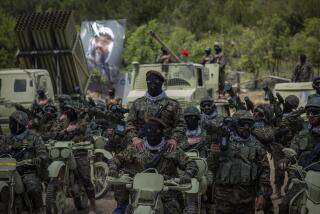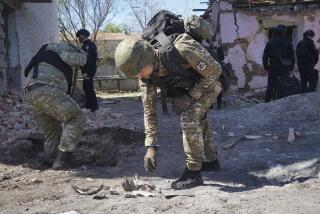Taliban Scatters in North, Pentagon Says
Amid reports of a widening rebellion in southern Afghanistan, Pentagon officials said Tuesday that Taliban troops are scattering in disarray from opposition forces that have taken over the top half of the country.
Gen. Richard B. Myers, chairman of the Joint Chiefs of Staff, said some of the Taliban troops who have been leaving the capital, Kabul, have been trying to carry out a military withdrawal, while others are trying to defect, and still others are “just trying to blend into the landscape, I would think.”
The retreat, which follows a 5-day-old rebel push, is “more disorganized than organized,” Myers told a Pentagon briefing.
In Pakistan, an eyewitness supported that assessment, telling of the panicked flight of Taliban troops and regime officials from Kabul as the opposition forces advanced.
Driving cars, pickup trucks and armored vehicles over unpaved roads, most troops from the Islamic movement headed for Lowgar province, just south of Kabul, to possibly form a new front line, said Danish Karokher, an Afghan journalist who fled to Pakistan.
A number of Taliban government ministers disappeared into the countryside, Karokher said. So did some Taliban fighters, who appeared to be returning to their homes in eastern and southern Afghan provinces.
Also on the road were vehicles of every description carrying city residents who feared the arrival of the Northern Alliance troops.
The price of a ride out of Kabul rose sixfold Monday, to about $50--a fortune for most Afghans.
Senior U.S. defense officials have sought to avoid appearing too optimistic about the opposition offensive, which has captured a series of cities in the country’s north.
And Myers stressed that the situation is still “dynamic” and that Taliban forces remain powerful.
Yet defense officials also made clear their view that the Taliban has suffered a major blow.
Myers said the opposition offensive has come at a time when Taliban leaders have had increasing difficulty communicating with their troops. And he said the 38-day-old U.S. bombardment, by taking out cargo planes, helicopters and other modes of transport, has made it difficult for the Taliban to bring up reinforcements.
Myers said opposition fighters who held a small portion of the country’s territory last week had by Monday taken all the northern Afghan provinces and had “fundamentally cut Afghanistan into two areas of control.”
“Now the Taliban have less than 20% of the territory of Afghanistan,” Northern Alliance Interior Minister Younis Qanooni told Reuters news service today in Kabul. His claim could not be verified.
Defense Secretary Donald H. Rumsfeld suggested that the Taliban forces are considering whether to reorganize to make a stand in the southern heartland, to defect or to hide. But he warned that if they make a stand, “we are going to get them,” and if they try to hide, “we will . . . root them out.”
Rumsfeld also predicted that if they flee to neighboring countries such as Pakistan or Iran, or seek sanctuary in countries that have often protected terrorists, “I doubt that they’ll find peace.”
Myers said U.S. officials had received reports of uprisings near Jalalabad, in the east-central part of the country, and near Kandahar, the Taliban’s spiritual center in the south. But he said defense officials had not confirmed the reports.
Rumsfeld acknowledged that a small number of U.S. ground forces entered Kabul with the Northern Alliance troops early Tuesday. Their role was to “give advice and counsel to the people who are in the city” and to report back to U.S. officials, he said.
Officials said U.S. warplanes have been trying to destroy the fleeing columns of Taliban troops.
Rumsfeld insisted that though these troops are in flight, they have refused to surrender and thus are a fair target for U.S. warplanes.
“They’re not surrendering, they’re not throwing down their weapons, they’re moving their vehicles, and [they are] a perfectly legitimate and attractive target,” he said.
At the same time, officials acknowledged that, amid the chaos, the difficulty of distinguishing friend from enemy has forced U.S. personnel to refrain from bombing many targets.
Rumsfeld noted that Taliban forces have stolen vehicles from many international aid organizations, a fact that compounds the difficulties in identifying targets.
The Taliban troops driving these vehicles “don’t appear to be functioning as military units, which makes it very difficult for people to sort them out, because we have to sort them from the air,” Rumsfeld said.
A number of Navy planes returned to aircraft carriers Tuesday still carrying their bombs, officials noted. And they predicted that the same thing will happen for the next several days as the Taliban continues to retreat, with the Northern Alliance in pursuit.
One defense official who asked that he not be identified said the Taliban retreats of the last few days suggest that U.S. airstrikes on the country’s front lines may have caused casualties that were “a lot larger than we thought.”
Rumsfeld insisted that the Northern Alliance forces that entered Kabul on Tuesday did so not to assert control of the city but only to halt looting. Only “small numbers” went in, he said, and they did so “to try to create order.”
Rumsfeld also angrily denied reports that Northern Alliance forces may have committed atrocities when they took over the city of Mazar-i-Sharif on Friday.
Rumsfeld scolded a reporter who asked about such reports, saying that the implication of such allegations “is that America is what’s wrong with the world, and it’s not.”
“I don’t know that it’s really useful to repeat unsubstantiated charges and sensational charges that I can’t validate and you can’t validate and that have not been checked,” he said.
Although Rumsfeld and Myers were careful not to appear to be gloating over the apparent progress of the Afghan campaign, Rumsfeld revealed some satisfaction that the conflict suddenly seemed to be going well, after a week in which some U.S. observers had begun to complain that it was beginning to look like a “quagmire.”
When a questioner noted that Rumsfeld had faced skeptical questions about the conduct of the war as recently as last week, the secretary broke into a broad smile.
That, he said, was “the understatement of the afternoon.”
*
Times staff writer Alissa J. Rubin in Peshawar, Pakistan, contributed to this report.
More to Read
Start your day right
Sign up for Essential California for news, features and recommendations from the L.A. Times and beyond in your inbox six days a week.
You may occasionally receive promotional content from the Los Angeles Times.







